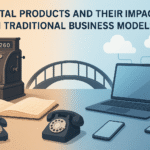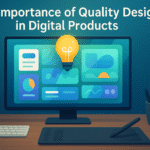How to Use AI to Personalize Your Digital Products
In the rapidly evolving digital landscape, personalization has become a crucial element for businesses aiming to stand out. With artificial intelligence (AI) at the forefront of technological innovation, personalizing digital products has never been more accessible—or more effective. In this blog post, we’ll explore how AI can revolutionize your approach to personalization, enhancing user experiences and boosting engagement.
Table of Contents
1. Introduction
2. Why Personalization Matters
3. How AI Enhances Personalization
4. Key AI Technologies for Personalization
5. Implementing AI in Your Strategy
6. Measuring Success
7. Conclusion
8. FAQs
Introduction
Imagine a world where your digital products adapt seamlessly to each user’s preferences, delivering content and experiences tailored just for them. With AI, this level of personalization is not only possible but also scalable. Whether you’re a startup looking to make your mark or an established brand aiming to deepen customer loyalty, AI-driven personalization can be your secret weapon.
Why Personalization Matters
Personalization is no longer a luxury; it’s a necessity. Users today expect experiences that are relevant and tailored to their needs. Personalization can lead to increased user satisfaction, higher conversion rates, and improved customer loyalty. In fact, studies show that businesses that excel at personalization generate more revenue and see higher customer engagement.
How AI Enhances Personalization
AI takes personalization to a new level by leveraging data-driven insights to predict user behavior and preferences. Here’s how AI can enhance your digital products:
1. Predictive Analytics: AI analyzes past user behavior to predict future actions, allowing you to anticipate user needs and offer personalized recommendations.
2. Real-Time Customization: With AI, you can dynamically adjust content and offerings in real-time, ensuring users always encounter the most relevant information.
3. Enhanced User Segmentation: AI can identify patterns and segment users more effectively, enabling more precise targeting and personalization.
Key AI Technologies for Personalization
Several AI technologies can be deployed to enhance personalization. Here are the most impactful ones:
1. Machine Learning (ML): ML algorithms can process vast amounts of data to recognize patterns and make predictions, which are crucial for personalizing user experiences.
2. Natural Language Processing (NLP): NLP enables digital products to understand and respond to user queries in a human-like manner, enhancing interaction and personalization.
3. Recommendation Engines: These engines use AI to analyze user data and provide personalized content, product, or service recommendations that align with user preferences.
Implementing AI in Your Strategy
Integrating AI into your personalization strategy requires careful planning and execution. Here’s a step-by-step guide to get you started:
Step 1: Define Your Goals
Establish clear objectives for what you want to achieve with AI-driven personalization. Whether it’s increasing user engagement or improving conversion rates, having a clear goal will guide your strategy.
Step 2: Gather and Analyze Data
AI thrives on data. Collect and analyze user data to understand behavior, preferences, and pain points. This data will be the foundation for your personalization efforts.
Step 3: Choose the Right AI Tools
Select AI technologies that align with your goals and are capable of processing your data effectively. Consider scalability and ease of integration when choosing these tools.
Step 4: Implement and Test
Start small with pilot tests to refine your approach. Use A/B testing to compare the effectiveness of AI-driven personalization against traditional methods.
Step 5: Iterate and Improve
AI personalization is an ongoing process. Continuously analyze results, gather feedback, and make necessary adjustments to improve the user experience.
Measuring Success
Once your AI personalization strategy is in place, it’s crucial to measure its effectiveness. Key performance indicators (KPIs) such as user engagement, conversion rates, and customer retention can provide valuable insights into the success of your efforts. Regularly reviewing these metrics will help you fine-tune your strategy and maximize ROI.
Conclusion
AI offers unprecedented opportunities for personalizing digital products, creating experiences that resonate with users on a personal level. By leveraging AI technologies, businesses can not only meet but exceed user expectations, fostering stronger relationships and driving growth. As AI continues to evolve, so too will the possibilities for personalization—stay ahead of the curve, and let AI transform how you connect with your audience.
FAQs
Q: What is AI personalization?
A: AI personalization involves using artificial intelligence technologies to tailor digital experiences to individual user preferences and behaviors.
Q: Why is personalization important for digital products?
A: Personalization enhances user satisfaction, increases engagement, and boosts conversion rates by providing relevant and customized experiences.
Q: How does AI improve personalization?
A: AI improves personalization by using data-driven insights to predict user behavior, customize content in real-time, and enhance user segmentation.
Q: What AI technologies are used for personalization?
A: Key technologies include machine learning, natural language processing, and recommendation engines.
Q: How can businesses measure the success of AI personalization?
A: Success can be measured using KPIs such as user engagement, conversion rates, and customer retention.
🌟 Embrace AI-driven personalization to unlock new potentials for your digital products and create experiences that truly resonate with your users! 🌟
Free Download!
Best Digital Product – eBooks, templates, AI tools, courses, and mor





